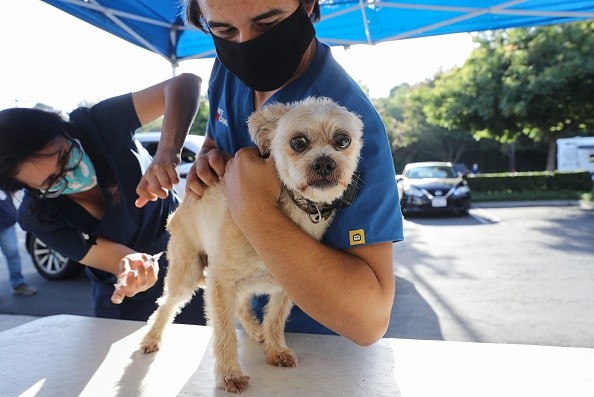Cats and dogs could be vaccinated against COVID-19 in the future, a group of scientists said.
Scientists claims vaccination of domestic animals is possible in the future

Scientists said transmission from animals to humans poses a 'significant long-term risk' as domesticated animals can become infected with coronavirus, and it could continuously evolve in them as well. In an editorial for the journal Virulence, experts from the University of East Anglia, the Earlham Institute in Norwich, and the University of Minnesota wrote, "It is not unthinkable that vaccination of some domesticated animal species might ... be necessary to curb the spread of the infection."
Last year, hundreds of COVID-19 cases were caused by variants linked with farmed mink in Denmark, leading to millions of animals being culled, Daily Mail reported.
Read also: 150 National Guard Members, 38 Capitol Police Officers Test Positive for COVID-19 Since US Capitol Riot
Cock van Oosterhout, one of the authors and professor of evolutionary genetics at UEA, said that it has a sense of developing vaccines for pets, which people need to be prepared for any 'eventuality.'
One of the authors, Cock van Oosterhout, professor of evolutionary genetics at UEA, said: 'It makes sense to develop vaccines for pets ... We really need to be prepared for any 'eventuality.' Oosterhaut pointed out that Russia started developing COVID-19 vaccine for pets.
Meanwhile, editor-in-chief of Virulence Kevin Tyler said cats are asymptomatic. However, they are infected by the virus, and they can transmit the virus to humans.
Tyler added the risk is as long as there are reservoirs that start to pass the virus as it did in mink from animal to animal. Therefore, it starts to evolve animal-specific strains. But they can transmit the virus to the human population and end up with a new COVID-19 variant related to what causes the whole thing all over again.
While mink were culled in Denmark, then thinking about domestic animals or pets, you might think that they can be vaccinated to stop the animals-to-human transmission of COVID-19 from happening. But Tyler claims that the scenario is not an obvious risk yet.
Like the COVID-19 UK variant, they said that more transmissible virus strains require people to be vaccinated to keep COVID-19 under control. Scientists wrote that vaccination against a viral pathogen with high prevalence worldwide does not have precedent, "and we, therefore, have found ourselves in uncharted waters."
Scientists urged governments to consider the continued implementation of strict control measures such as wearing masks and social distancing as the only way to decrease the development and spread of new COVID-19 variants.
Read also: Elderly Couple Receive COVID-19 Vaccine as They Celebrate 73rd Wedding Anniversary
Why we may need to consider vaccinating pets against Covid-19
Domestic animals, companions, or pets, such as cats and dogs, could be required to be vaccinated against COVID-19 to curb the virus' spread, as per scientists. There are fears mutated forms of the coronavirus could be passed to humans in the future, although there is no evidence that COVID-19 has passed to humans from animals, according to Chronicle Live.
Demand for dogs and cats surges
Amid the COVID-19 pandemic, Germans discover their love of animals. According to DW via MSN, the traditional favorite animals; cats and dogs, are in particular in demand.
Before the pandemic started, one in four German households had a cat, and one in five had a dog. In times of restrictions and lockdowns, people became lonely, and many who work from home or in furlough had time to look after a pet. The requests are surging massively. About 20% more dogs were bought in 2020 than in previous years, based on the German Kennel Club (VDH) report.
Read also: Tech Giants Join Forces To Create Digital COVID-19 Vaccination Passport
© 2026 HNGN, All rights reserved. Do not reproduce without permission.








